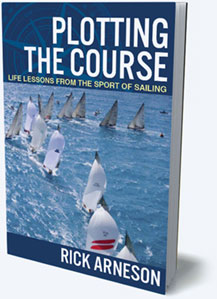In writing Plotting the Course, I found myself employing a particular word time and again throughout the text: ambition. It is a word that I use to describe the quest for growth, improvement, and achievement through setting goals and taking action to make great things happen. And yet, it’s also a word heard all too often these days in a negative context, as if to imply greed or unscrupulousness. What I suspect has happened in some circles is that the word ambition is being confused with blind ambition. Blind ambition means obsessively pursuing a goal at any cost, blind to morality or consequence, while ambition itself is the driving force behind improvement and accomplishment.
Perhaps the source of this muddled definition comes from glaring examples of ambition misused. Shakespeare vividly illustrated the dark desires of such characters as Macbeth (“I have no spur to prick the sides of my intent, but only vaulting ambition, which o’erleaps itself and falls on the other”) and Richard III (“I am determined to prove a villain and hate the idle pleasures of these days”), creating images of power-mad monsters who murder their way to the top. Even the villain Scar of The Lion King sang a sinister song of his evil ambitions. So, what seems to have become ingrained in some people’s minds is that an ambitious person must be at best aloof, often heartless, and at worst malevolent. This broad mischaracterization of the term, however, is not the ambition that I refer to in Plotting the Course, nor a definition thereof that I would generally apply. Not all who are strong are bullies, and not all with ambition act unethically.
An ambitious spirit, like money, is an engine of forward movement; it can be used for good or bad purposes, but the lack of it means stagnation. Ambition is something all people need to thrive. It’s what gets them off the couch to exercise, or over to the library to study, or out of bed a little earlier to make sure they’re not late to work. Anyone who wants to get somewhere in life, even if it’s just a small step up, needs that little spark of ambition to envision a brighter future and make it a reality. It’s the absence of ambition in the hearts of the people that threatens society’s advancement; without ambition, people stop dreaming, stop trying, and stop succeeding.
Ambition itself–the desire to succeed– is a virtue, while the nature of one’s ambition is a reflection of their character. Whenever we seek a positive outcome, the ambition towards that cause can drive us to accomplish great things both for ourselves and our community. With that in mind, let’s restore the usage of this particular word to its intended context, that its place in our vernacular may accurately reflect the benefits of ambition to us as individuals. It’s a first step towards boosting our collective potential for achievement as a society.
Rick Arneson, M.B.A., is the author of Plotting the Course and a competitive sailor with over three decades of sailing experience.
Tags: ambition, Plotting the Course












